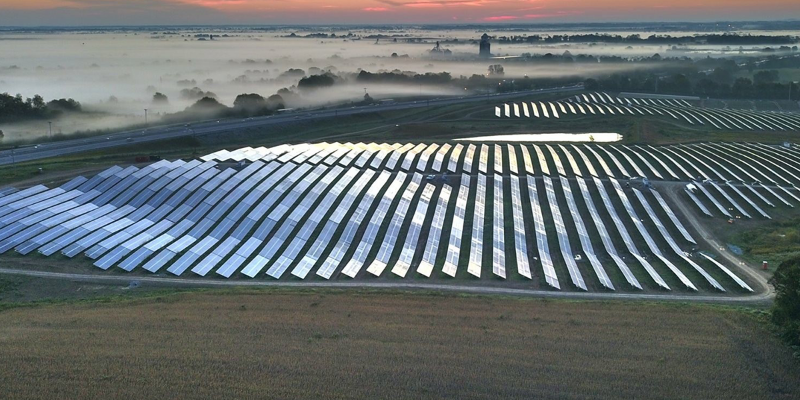
As the trend of environmental, social and corporate governance (ESG) investing continues to gather steam, electric utilities are seeing a growing number of commercial and industrial (C&I) companies interested in minimizing their impact on the environment by sourcing more renewable energy and opportunities to collaborate with them to meet their ESG goals.
Last year, for example, global spirits maker
Diageo announced plans for its first carbon-neutral distillery. Generation and transmission (G&T) system
East Kentucky Power Cooperative (EKPC) and its member distribution cooperative
Inter-County Energy Cooperative worked with Diageo to power the $130 million distillery, currently under construction in Lebanon, Kentucky, with 100 percent renewable electricity.
“The ability to obtain renewable energy is definitely an attribute being sought by a growing segment of corporations as they assess possible sites for location and expansion of facilities,” EKPC Manager of Corporate Technical Services Scott Drake said. “It is important that electric cooperatives are able to provide options for meeting those needs reliably and affordably in order to compete for facilities and to retain and grow jobs and investment in the communities we serve.”
Diageo—the producer of Captain Morgan rum, Johnnie Walker scotch whisky, Smirnoff vodka, Guinness beer and many other brands—has broken ground on the distillery, and the site is expected to be fully operational later this year.
G&T and Distribution Co-ops Help Member Achieve Renewable Energy Goal
In announcing its power supply agreement with EKPC and Inter-County Energy, Diageo said the new 72,000-square-foot facility reflects Diageo’s “commitment to achieving net-zero carbon emissions and moves the company closer to its goal of sourcing 100 percent of its electricity from renewable sources by 2030.”
Notably, some of Diageo’s focus on achieving net-zero emissions at the Lebanon distillery relies on increased electrification of operations, which will boost its overall electric load. For example, Diageo will use special electrode boilers, rather than fossil-fuel fired boilers; 100 percent of the steam used onsite, including for the cooking, distillation and drying process, will be produced by the electrode boilers; and all work vehicles operated onsite, including trucks and forklifts, will be electric and charged onsite.
To power its new facility, Diageo will utilize a Cooperative Solar Tariff to license 333 solar photovoltaic (PV) panels from EKPC-operated Cooperative Solar Farm One, a 60-acre, 8.5-MW cooperative solar farm project built in 2017. The PV panels will provide approximately 153,000 kilowatt-hours of power to the distillery each year.
First C&I Member to Use New Kentucky Renewable Energy Program
Additionally, Diageo is the first C&I cooperative member to take advantage of a new Wholesale Renewable Energy Program Tariff, approved by the Kentucky Public Service Commission in 2020. This so-called “Green Tariff” enables C&I members with demand of 1 MW or greater to purchase all or part of their energy from renewable sources under a long-term agreement, receiving credit for certain avoided costs and being billed for renewable energy supply.
For the “Green Tariff” portion of the net-zero carbon emissions power supply plan, EKPC has issued a Request for Proposals (RFP) seeking 50 MW of solar PV power and 10 MW of wind power through a power purchase agreement (PPA). The RFP is being run by
National Renewables Cooperative Organization.
EKPC will also purchase renewable energy credits to complete the greening of Diageo’s power supply and to ensure that Diageo has adequate renewable energy without over purchasing through the PPA.
Interest in Renewable Power Grows
The cooperative expects more C&I members will request similar renewable power sourcing arrangements in the future.
“There is a growing demand for renewable energy, both from residential co-op members and C&I members,” Drake explained. “As more corporations and other organizations institute sustainability goals, EKPC and its 16 owner-member co-ops expect to receive more requests of this kind.”
Besides Diageo, three other C&I members recently have contacted their distribution cooperatives to explore options for obtaining renewable energy for their facilities, Drake said. “Fortunately, renewables are becoming more cost-competitive and can provide greater fuel diversity for EKPC.”
EKPC Announces Corporate Sustainability Plan
In December, EKPC unveiled its own corporate sustainability plan. The plan establishes goals of reducing carbon dioxide emissions 70 percent by 2050 based on 2010 emissions levels, and obtaining 15 percent of energy from new renewables by 2035.
“We must recognize that we face shifting expectations from a growing number of stakeholders, including cooperative members, policymakers, lenders and others,” EKPC Executive Vice President and Chief Operating Officer Don Mosier said. “Developing and maintaining this sustainability plan better prepares EKPC to monitor the horizon and to quickly adapt to meet changing needs and expectations.”
